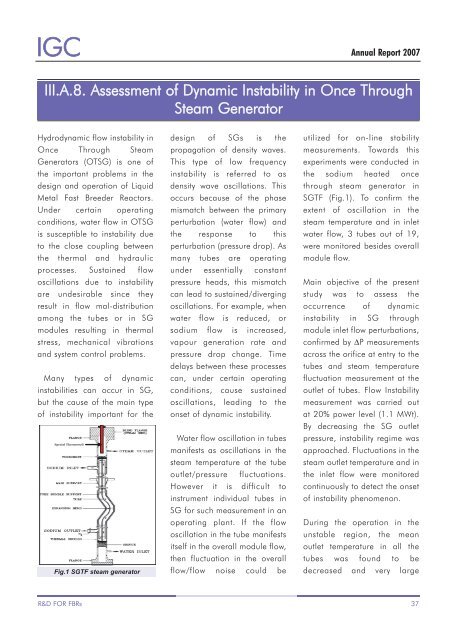IGCAR : Annual Report - Indira Gandhi Centre for Atomic Research
IGCAR : Annual Report - Indira Gandhi Centre for Atomic Research
IGCAR : Annual Report - Indira Gandhi Centre for Atomic Research
Create successful ePaper yourself
Turn your PDF publications into a flip-book with our unique Google optimized e-Paper software.
IGC<br />
<strong>Annual</strong> <strong>Report</strong> 2007<br />
III.A.8. Assessment of Dynamic Instability in Once Through<br />
Steam Generator<br />
Hydrodynamic flow instability in<br />
Once Through Steam<br />
Generators (OTSG) is one of<br />
the important problems in the<br />
design and operation of Liquid<br />
Metal Fast Breeder Reactors.<br />
Under certain operating<br />
conditions, water flow in OTSG<br />
is susceptible to instability due<br />
to the close coupling between<br />
the thermal and hydraulic<br />
processes. Sustained flow<br />
oscillations due to instability<br />
are undesirable since they<br />
result in flow mal-distribution<br />
among the tubes or in SG<br />
modules resulting in thermal<br />
stress, mechanical vibrations<br />
and system control problems.<br />
Many types of dynamic<br />
instabilities can occur in SG,<br />
but the cause of the main type<br />
of instability important <strong>for</strong> the<br />
Special Thermowell<br />
Fig.1 SGTF steam generator<br />
design of SGs is the<br />
propagation of density waves.<br />
This type of low frequency<br />
instability is referred to as<br />
density wave oscillations. This<br />
occurs because of the phase<br />
mismatch between the primary<br />
perturbation (water flow) and<br />
the response to this<br />
perturbation (pressure drop). As<br />
many tubes are operating<br />
under essentially constant<br />
pressure heads, this mismatch<br />
can lead to sustained/diverging<br />
oscillations. For example, when<br />
water flow is reduced, or<br />
sodium flow is increased,<br />
vapour generation rate and<br />
pressure drop change. Time<br />
delays between these processes<br />
can, under certain operating<br />
conditions, cause sustained<br />
oscillations, leading to the<br />
onset of dynamic instability.<br />
Water flow oscillation in tubes<br />
manifests as oscillations in the<br />
steam temperature at the tube<br />
outlet/pressure fluctuations.<br />
However it is difficult to<br />
instrument individual tubes in<br />
SG <strong>for</strong> such measurement in an<br />
operating plant. If the flow<br />
oscillation in the tube manifests<br />
itself in the overall module flow,<br />
then fluctuation in the overall<br />
flow/flow noise could be<br />
utilized <strong>for</strong> on-line stability<br />
measurements. Towards this<br />
experiments were conducted in<br />
the sodium heated once<br />
through steam generator in<br />
SGTF (Fig.1). To confirm the<br />
extent of oscillation in the<br />
steam temperature and in inlet<br />
water flow, 3 tubes out of 19,<br />
were monitored besides overall<br />
module flow.<br />
Main objective of the present<br />
study was to assess the<br />
occurrence of dynamic<br />
instability in SG through<br />
module inlet flow perturbations,<br />
confirmed by ∆P measurements<br />
across the orifice at entry to the<br />
tubes and steam temperature<br />
fluctuation measurement at the<br />
outlet of tubes. Flow Instability<br />
measurement was carried out<br />
at 20% power level (1.1 MWt).<br />
By decreasing the SG outlet<br />
pressure, instability regime was<br />
approached. Fluctuations in the<br />
steam outlet temperature and in<br />
the inlet flow were monitored<br />
continuously to detect the onset<br />
of instability phenomenon.<br />
During the operation in the<br />
unstable region, the mean<br />
outlet temperature in all the<br />
tubes was found to be<br />
decreased and very large<br />
R&D FOR FBRs 37

















